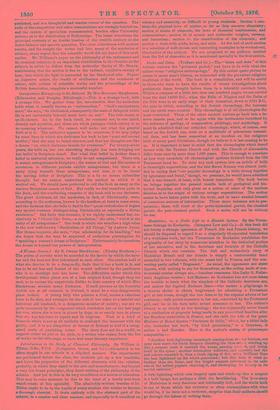Omnipotence Belongs only to the Beloved. By Mrs. Brewster Macpherson.
(Edmonston and Douglas, Edinburgh.)—This is a strange book, with a strange title. We gather from the introduction that the authoress holds what is usually known as " universalism." "God's omnipotence must," she says," be vindicated, consequently the state of things in which He is not universally beloved must have an end." The title seems to us ill-chosen. As to the book itself, its contents are, to our mind, dreamy and mystical, and there are whole passages which convey to us no meaning whatever. We cannot well make out what the general drift of it is. The authoress appears to be conscious, if we may judge by some lines in which she dedicates her boek to her "aunt and second mother," that she may be found obscure, and that her thoughts are like a dream " on which darkness broods for evermore." For twenty-seven years, she tells us, her one absorbing thought has been bringing out her belief in Scripture detail. But what that belief is, farther than a belief in universal salvation, we really do not comprehend. There are, it seems, antagonisms in Scripture ; the names of God and His modes of revelation in different periods exhibit antagonisms, but there is a unity lying beneath these antagonisms, and here is to be found the uniting letter of Scripture. This is a by no means unfamiliar thought, but we cannot understand the method in which it is worked out. We should have preferred to call the book an essay on the various Scriptural names of God. But really we feel ourselves quite in the dark, and the concluding remarks of the book add to our darkness. The great doctrines, all the mysteries, in fact, of Christianity, were, according to the authoress, known to the heathen, at least in some sense, and she declares that she fails to find in the" quasi-orthodoxies of dogma any special treasure distinguishing Christianity as especially a divine revelation." She finds this treasure, if we rightly understand her, ex- clusively in " Christ-like lives,—a revelation," sho adds, "which is the unity of all antagonisms." Ono book to which she attaches a high value is the now well-known "Restitution of All Things," by Andrew Jukes. Her theme requires, she says, "ripe scholarship for its handling," but she hopes that she may be acquitted of audacious presumption for " speaking a woman's dream of Scripture." Unfortunately for ourselves, the dream is beyond our powers of interpretation.


































 Previous page
Previous page